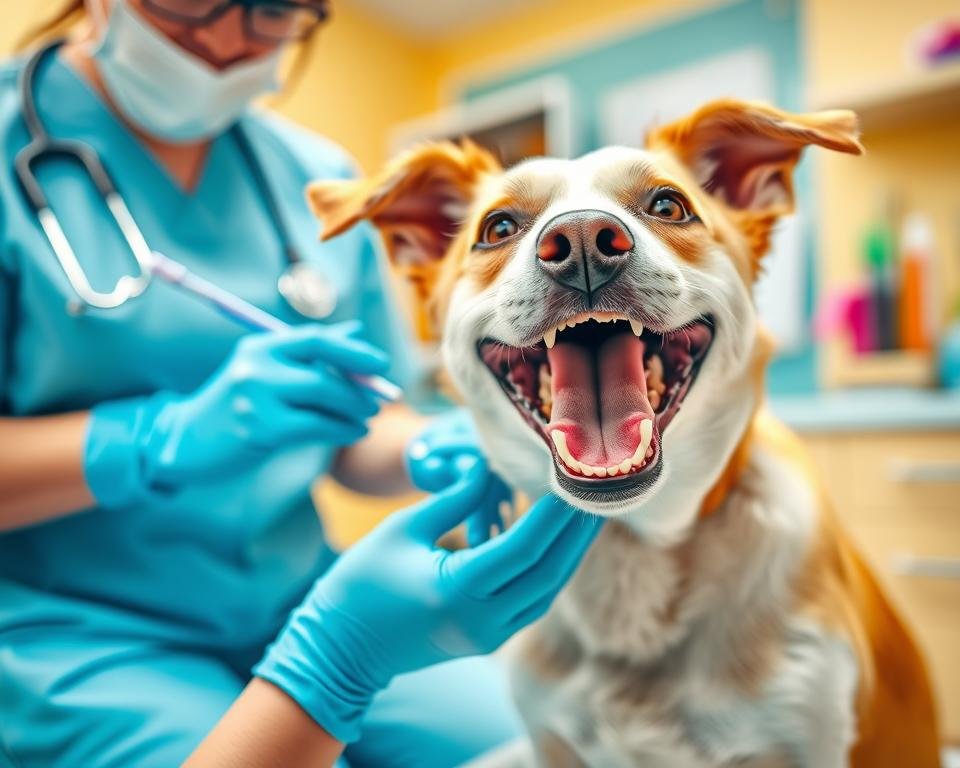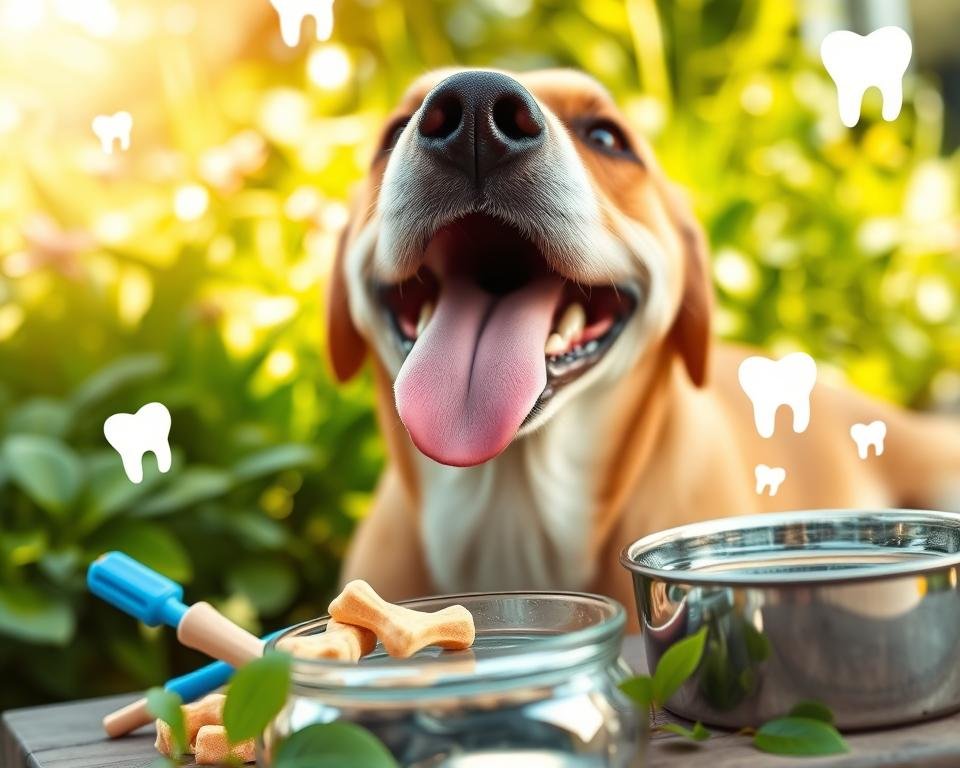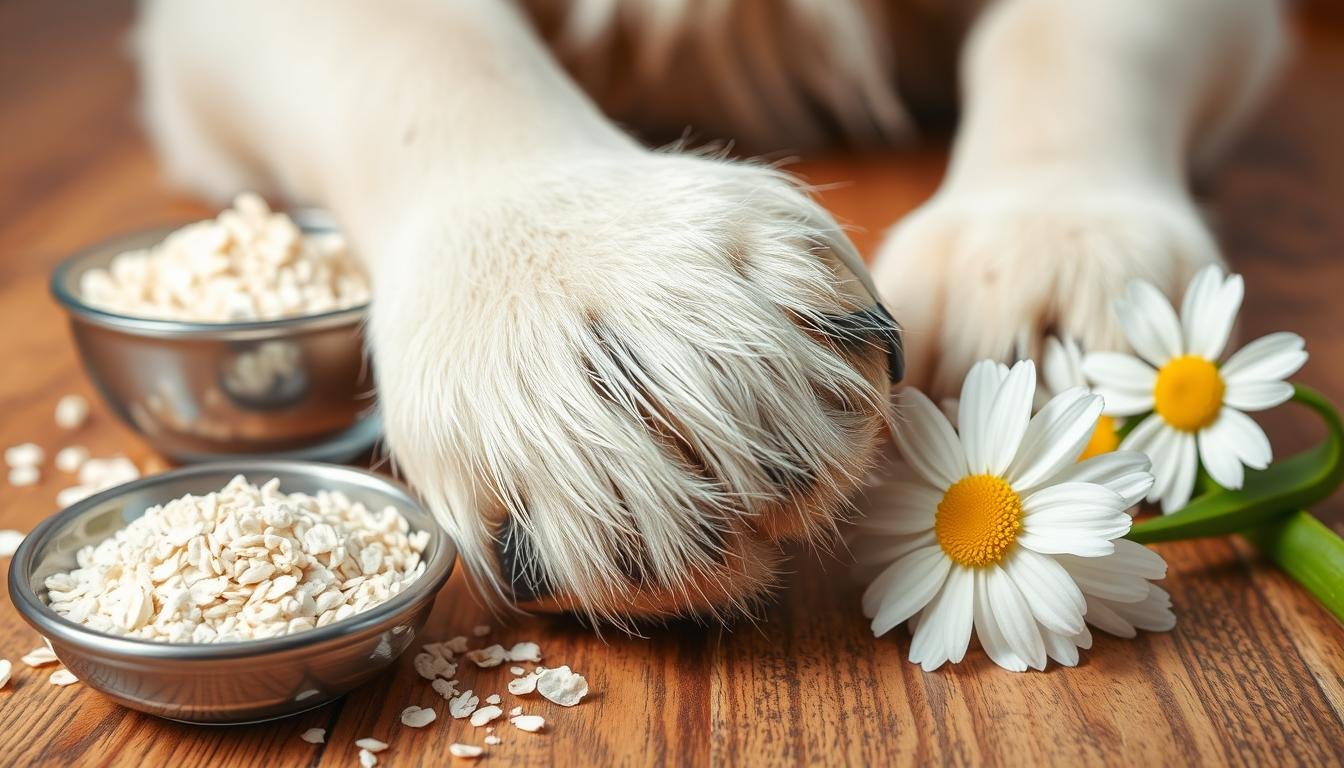Tooth decay is a big problem for dogs, hitting over 80% of them by the time they’re three. Unlike humans, dogs mostly face periodontal disease. This is caused by bacteria that turn into plaque and then tartar, leading to tooth decay and gum disease.
It’s important to catch and treat dental issues early. If not, they can cause pain, infections, and even harm to organs.
Keeping your dog’s teeth clean is key. This includes regular dental check-ups, professional cleanings, and taking care of their teeth at home. Daily brushing and dental-friendly foods can help prevent tooth decay and gum disease.
Knowing the causes, signs, and risks of tooth decay helps dog owners protect their pets’ teeth and gums. This way, they can keep their dogs healthy and happy.
Understanding Canine Tooth Decay and Its Impact
Tooth decay in dogs is a serious problem if not treated quickly. It starts with plaque, a sticky film of bacteria on teeth. This plaque turns into tartar, leading to tooth decay.
What Causes Tooth Decay in Dogs
Plaque on a dog’s teeth can harden into tartar, starting tooth decay. If ignored, it can cause gingivitis, with red, swollen gums that bleed easily. Gingivitis can turn into periodontitis, harming the teeth’s support and leading to tooth loss and abscesses.
Common Signs of Dental Problems
- Bad breath
- Red or swollen gums
- Visible tartar buildup
- Difficulty eating
- Pawing at the mouth
Risk Factors and Predisposed Breeds
Certain dog breeds face a higher risk of dental issues. Small breeds like Pugs, Chihuahuas, and Dachshunds, and brachycephalic dogs like Bulldogs and Shih Tzus, are more likely to have dog decaying teeth and dental issues in dog.
“Untreated dental issues in dogs can lead to bacteria entering the bloodstream and affecting major organs like the heart, liver, and kidneys.”
Periodontal disease, affecting the tooth’s surrounding tissues, is common in dogs. If not treated, it can cause tooth loss and health problems.
Regular dental check-ups and cleanings are key to preventing and treating dog decaying teeth. Daily dental care, like brushing with dog-specific toothpaste and dental chews, also helps keep their teeth healthy.
Dog Dental Decay: Prevention and Early Detection
Keeping your dog’s teeth clean is key to their health. To stop tooth decay, start with good oral care. Brushing their teeth with dog toothpaste is the best way to fight plaque and cavities.
Dental treats, toys, and water additives can also help. The Veterinary Oral Health Council checks these products to see if they work well.
Spotting dental problems early is important. Look for signs like yellow teeth, gum problems, or odd chewing. Regular vet visits can catch issues before they get worse. Early stages of gum disease can be fixed, but advanced cases can’t.
“Preventing tooth decay in dogs starts with good dental hygiene habits and early detection of any issues.”
Focus on your dog’s oral health to avoid pain and health problems. Regular dental care and vet visits can keep their teeth healthy for a long time.
Professional Dental Care and Treatment Options
Keeping our dogs’ teeth healthy is key. At the vet, they get a full dental check, scaling, and polish under anesthesia. X-rays help check the tooth roots and bone, making sure everything is okay.
Dental Cleaning Procedures
The dental cleaning process has several steps to get rid of dog dental decay and plaque. First, the vet uses special tools to remove tartar and calculus. Then, they polish the teeth to remove any leftover debris.
They might also apply fluoride to strengthen the enamel and prevent future problems.
Treatment for Different Stages of Decay
- For stage 1 or 2 cavities, the vet might just remove the decay and fill the tooth.
- Stage 3 decay might need a root canal to save the tooth.
- In stages 4 and 5, where decay is severe, removing the tooth might be best.
In some cases, advanced treatments like guided tissue regeneration might be needed. These are usually done by specialized veterinary dentists.
When Surgery or Extraction Is Necessary
If a dog’s tooth is badly damaged or decayed, or if it’s a health risk, removing it might be the best choice. This is often the case for dogs with advanced periodontal disease or big tooth fractures. The vet will carefully take out the tooth, making sure the area heals well and the dog stays comfortable.
“Skipping annual professional cleaning could put dogs at risk of developing gingivitis, periodontal disease, bad breath, and in severe cases, pain, tooth decay, and tooth loss.”

Daily Dental Care Routine for Dogs
Keeping up with a daily dental care routine is key to stop dog decaying teeth and fix dental issues in dog. Start by brushing your dog’s teeth with special toothpaste and brushes. Make sure to introduce dental care slowly and positively.
Adding dental chew toys can help remove plaque. Some dog foods and water additives also aid in dental health. Sticking to a routine is vital for your dog’s dental well-being.
- Brush your dog’s teeth daily using a soft-bristled toothbrush and dog-safe toothpaste.
- Provide dental chew toys that help scrape away plaque and tartar buildup.
- Consider incorporating dental-friendly dog food and water additives into your pet’s diet.
- Regularly check your dog’s gums and teeth for any signs of dental problems.
- Consult with your veterinarian for personalized recommendations on maintaining your dog’s dental health.
By establishing a consistent daily dental care routine, you can help prevent dog decaying teeth and address any dental issues in dog before they become more serious problems.
“Dental disease is one of the most common health problems in dogs, and it’s also one of the most preventable.” – Dr. Jill Sackman, Veterinary Dentist
Diet and Dental Health: Making the Right Choices
A dog’s diet is key to their dental health. Dental diets help cut down on plaque and tartar. These are big causes of dog dental cavity and other mouth problems. Dry kibble can clean teeth but isn’t a full dental care replacement.
Best Foods for Dental Health
Choose dog foods with fatty acids, antioxidants, and probiotics. These help keep gums and teeth healthy. They fight inflammation, keep tissues strong, and control bad bacteria that harm unhealthy dog teeth.
Harmful Foods and Chews to Avoid
Avoid hard items like ice cubes, bones, and hard nylon chews. Also, skip antlers, horse, or pig hooves as they can break teeth. Opt for soft, flexible chew toys instead.
Dental Treats and Supplements
Dental treats and supplements can fight plaque. But, pick ones that the Veterinary Oral Health Council has approved. They ensure they’re good for your dog’s teeth.



